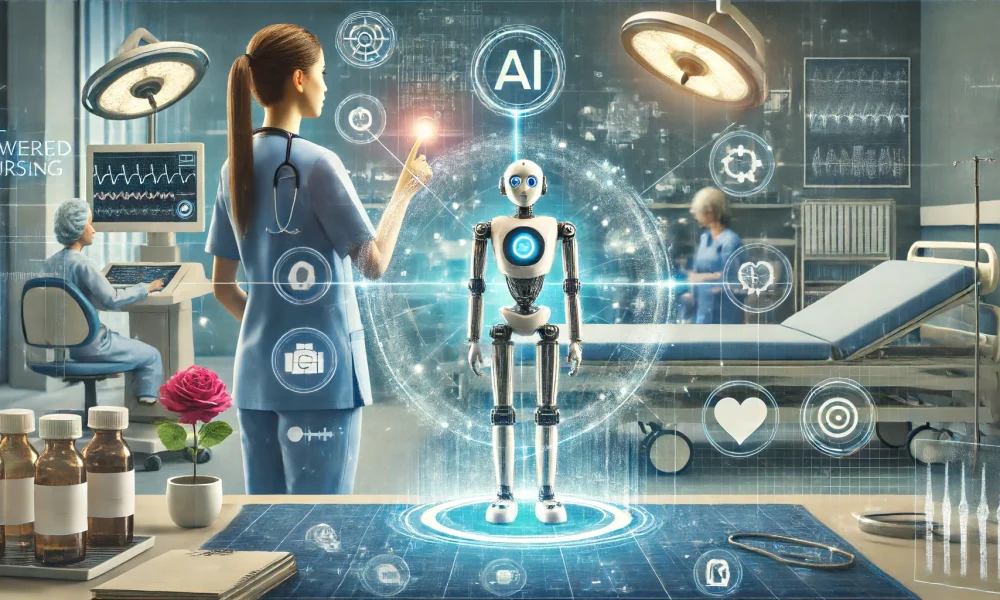The business landscape is a constant obstacle course of inefficiencies and complex decision-making. Overcoming these hurdles is a race for sustained growth in today’s era of digital acceleration. Artificial intelligence (AI) has transformed from a buzzword to a tool to help achieve strategic advantage across various sectors. It offers not just a one-size-fits-all solution, but rather a toolbox of tailored solutions designed to address the specific challenges faced by major industries, from navigating financial market fluctuations to optimizing manufacturing production lines and personalizing retail customer experiences. AI’s transformative impact is reshaping traditional paradigms, creating a future where entire industries operate under a new set of rules.
The nursing field, a cornerstone of the healthcare system, is no exception to this phenomenon of AI transformation. The widespread adoption of AI is significantly reshaping the way nurses deliver care. As AI continues to evolve, its influence on nursing will only grow, making it essential for nurses and healthcare leaders to become fluent in these new technologies. From enhancing clinical decision-making to optimizing workflow and improving patient care, AI is reshaping the roles and responsibilities of nurses. By leveraging AI, nurses can access advanced tools and resources that support their critical work, ultimately leading to more efficient and effective patient care. Here are a few ways that nurses are leveraging the tool:
1. Supporting medical diagnostic and nursing care
AI significantly enhances diagnostic accuracy in medicine through advanced imaging and pattern recognition technologies. AI algorithms can analyze medical images, such as X-rays, MRIs, and CT scans, with remarkable precision, identifying anomalies and patterns that the human eye may miss. For instance, AI-powered tools can detect early signs of diseases like cancer or neurological disorders, facilitating early intervention and improving patient outcomes.
In nursing, predictive analytics leverages large datasets to predict disease onset and progression. Many are probably familiar with early warnings of sepsis. In the not-so-distant future, many disease processes will be monitored with early interventions initiated via the help of virtual assistants. This is done by analyzing a patient’s medical history, genetic information, lifestyle factors and hemodynamic status. AI can provide nurses and healthcare providers with actionable insights to manage acute and chronic conditions more accurately and swiftly, reducing readmissions and enhancing patient care.
2. Developing treatment plans
AI also plays a crucial role in developing personalized treatment plans by tailoring interventions to the unique needs of individual patients. AI systems analyze comprehensive patient data, including genetic profiles, treatment responses, and real-time health metrics, to recommend personalized treatment strategies. This personalized approach ensures that patients receive the most effective treatments, minimizing adverse reactions and maximizing therapeutic outcomes. Furthermore, AI continuously monitors patient progress, allowing for dynamic adjustments to care plans. By analyzing ongoing patient data, such as vital signs and laboratory results, AI can alert healthcare providers to any deviations from expected recovery trajectories, enabling timely modifications to treatment plans. This proactive and personalized approach in clinical decision support significantly enhances the quality of care that nurses can provide, ensuring optimal patient outcomes.
3. Streamlining nursing workflows
Automated scheduling and staffing systems utilize AI to predict staffing needs, optimize shift patterns, and ensure adequate coverage, thereby reducing the administrative burden on nursing managers and minimizing scheduling conflicts. Similarly, AI-driven documentation and record-keeping systems streamline the process of maintaining patient records. These systems can automatically update and organize patient data, ensuring accuracy and compliance with healthcare regulations. By reducing the time spent on these repetitive tasks, nurses can devote more time to direct patient care, enhancing the overall efficiency and effectiveness of healthcare delivery.
Virtual assistants, powered by AI, can handle routine inquiries from patients, such as medication reminders, appointment scheduling, and basic health information, providing immediate responses and support. This technological integration can both improve patient engagement and reduce the workload on nursing staff. Further, AI enables real-time access to patient data, allowing nurses to quickly retrieve and review a patient’s medical history, lab results, and treatment plans. Immediate access to comprehensive patient information facilitates informed decision-making and prompt responses to patient needs. By integrating AI into these aspects of nursing workflow, healthcare providers can enhance the efficiency of care delivery, improve patient outcomes, and create a more streamlined and responsive healthcare environment.
More Efficient Care Delivery – If Executed Correctly
The integration of artificial intelligence into the nursing field signifies a transformative shift in healthcare, offering numerous benefits that enhance both patient care and nursing efficiency. AI’s capacity to improve diagnostic accuracy through advanced imaging and predictive analytics equips nurses with precise tools to detect and manage health conditions early, thereby improving patient outcomes and reducing diagnostic errors. Personalized treatment plans, enabled by AI, tailor interventions to the unique needs of each patient and dynamically adjust based on real-time data, ensuring effective and responsive care.
AI enables healthcare providers to alleviate administrative burdens and redirect their focus toward direct patient care.. However, despite the evident advantages, integrating AI into nursing presents challenges, including the imperative need for robust data security, ethical considerations surrounding AI-driven decisions, and the necessity for ongoing education and training for nursing professionals. Addressing these challenges is paramount to fully harnessing the potential benefits of AI in healthcare.
Looking forward, the potential for AI to further revolutionize nursing practice is immense. As emerging AI technologies continue to develop, they promise to bring even greater efficiencies and capabilities, transforming how nurses deliver care and interact with patients. By embracing AI, the nursing field can evolve, ensuring that healthcare delivery becomes more efficient, personalized, and effective. The collaboration between AI developers and healthcare providers will be essential in navigating this transformation, leading to a more responsive and patient-centered healthcare system.

Credit: Source link











































